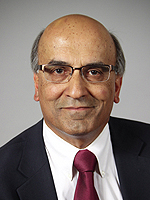Recent News
NE students visit Institute for Space and Nuclear Studies
September 15, 2025
Perfetti receives ANS Landis Engineering Achievement Award
June 26, 2025
UNM to host first-ever residential nuclear engineering camp
May 29, 2025
UNM faculty chair international nuclear conference on Mathematics and Computational Methods
April 25, 2025
News Archives
Prinja Spotlighted in National University Consortium Newsletter
August 1, 2016
Member Spotlight
 Dr. Anil K. Prinja, and the department he leads, is in a good place.
Dr. Anil K. Prinja, and the department he leads, is in a good place.
Prinja is chairman of the Department of Nuclear Engineering at the University of New Mexico (UNM). Prinja’s school is one of five in the National University Consortium, a Battelle Energy Alliance-sponsored partnership that links Idaho National Laboratory with institutions of higher learning around the country. The other NUC partners are MIT, Oregon State, Ohio State and North Carolina State universities.
Prinja has been on the faculty at UNM since 1987 and has a long history of working with INL. It comes as no surprise then that Prinja was selected to serve on INL’s Board of Managers. He attended his first meeting in March and said he walked away impressed with Director Mark Peters’ vision and the lab’s efforts to connect with local universities.
Talk to Prinja and you hear enthusiasm, about his department and the potential to grow its relationship with the nation’s lead nuclear research, development and demonstration laboratory. Like many nuclear veterans, Prinja has experienced enough of the bad times to appreciate the space his industry occupies today.
Prinja earned his Ph.D. in nuclear engineering at the University of London, then crossed the ocean and spent eight years as a research faculty member at UCLA. This was the 1980s, however, and UCLA, like many universities, ended its nuclear engineering department, leaving Prinja searching for work in a field on the decline.
“Nuclear was in very bad shape at the time,” he said. UNM had a nuclear engineering program dating back to the early 1960s. In 1972, it merged with the chemical engineering department and Prinja eventually joined that faculty. In 2014, chemical and nuclear went their separate ways, with Prinja selected to head up the newly minted UNM Department of Nuclear Engineering.
Prinja has embraced the challenge of evolving his department from one constantly in survival mode to one that is growing and evolving.
The department began with seven people, but is expanding. Prinja said he is attempting to hire two new faculty members who would specialize in nuclear fuels, in part because that’s an area of widespread interest but also because of the potential for greater collaboration with INL.
“We hope to have a significant overlap with INL with the new hires,” Prinja said.
In truth, that’s already happening. Prinja said three UNM faculty and two students are currently involved in INL projects that are funded under the LDRD program. Also, the school is preparing for its inaugural joint appointment with the lab. INL and UNM have been, as Prinja said, “joined at the hip” since BEA took over management of the lab in 2004.
Dr. Edward Blandford and his graduate students collaborate with INL research staff to perform an experimental investigation on boiling heat transfer and pressure drop characteristics of key accident tolerate fuel clad concepts.
Dr. Adam Hecht has an INL-funded project to investigate live time and integrated neutron effects on crystals via optical characterization to enable neutron dosimetry in harsh environments. The intent is to enable live-time dosimetry using crystals within the TREAT reactor.
“It’s a very strong and powerful arrangement,” Prinja said. “It’s proven very beneficial to us and I want to grow it as much as I can.”
INL also has a bigger vision with its NUC partners. UNM, for example, has exceptional capabilities in cyber security and modeling and simulation.
“My recent visit left me with the vivid impression that UNM is thoughtfully expanding their program with INL specifically in mind,” said Marsha Bala, INL’s NUC program director. “New faculty in nuclear fuels and materials, the possibility of an industrial control and cybersecurity master’s and/or summer school, and successful research collaborations indicate a pivotal expression of partnership.”
